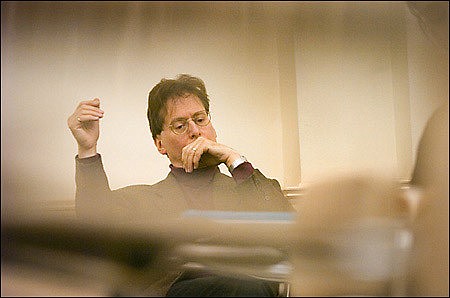- April 18, 2024
-
-
Loading

Loading

Let’s be philosophical for a moment. There are certain people who are born with a gift. It may be for music, art, curing, even the law. If they’re fortunate, their circumstances allow them to discover that gift and nurture it. But what we sometimes forget, or disregard, is that the gifted are always students. Musicians, artists, doctors, lawyers and teachers are perpetually learning, so, in a way, the students in the Sarasota Music Festival are not only the youngsters who’ve come from all over the world to play but also the mentors whose names we’ve known for years.
That said, we have to remember that those of us in the audience — the listeners — are also students and, when we attend a performance, we’re hearing music we know in a new way, just as we’re hearing works that are new to us that are expanding our senses and opening our ears.
This past weekend, the Sarasota Music Festival stimulated our sensibilities in ways that made us appreciate this extraordinary teaching and performing organization in ways we’ve not experienced before. Take, for instance, the performance Friday evening at the Opera House of “Songs America Loves to Sing,” a work new to the festival, by John Harbison.
The Atlanta Chamber Players and the Da Capo Chamber Players commissioned the piece in 2004, Scored for five instruments — flute (Leone Buyse), clarinet (Charles Neidich), violin (Noah Bendix-Balgley), cello (Timothy Eddy) and piano (Michael Adcock) — it was commissioned in 2004 by the Atlanta Chamber Players and the Da Capo Chamber Players. Harbison, one of this country’s best known and most celebrated living composers, gives each section of the work a piece of Americana from “Amazing Grace” and “We Shall Overcome” to “Love Me Tender,” “What a Friend We Have in Jesus,” and “Poor Butterfly,” with each of the instrumentalists using his or her instrument to proffer these familiar tunes as songs without words in distinctly different settings. There are asymmetrical meters, hilariously drunken, askew readings and harmonies taking us from jazzy saloons to sensitive salons.
Neidich’s solo introduction to “Poor Butterfly” led us on a lengthy, dizzily florid chase before coming (somewhat) down to Earth and settling into the actual song, leaving no doubt about the prowess and vulnerability of this fluttering butterfly. Bendix-Blagley, who was a student at the festival from 2003 to 2005 before achieving international fame as a chamber musician and, most recently, joining the Pittsburgh Symphony as concertmaster, donned dark glasses for a jazzy, charmingly wonky setting of “St. Louis Blues.”
But the most hilarious segment came at the end when “Down by the Riverside” and “Happy Birthday” harmonically turned the stage into one gigantic drunken hoedown. What fun. What lopsided, cockeyed joy. What imagination.
The same evening sported an ethereal reading of Wagner’s “Siegfried Idyll,” a work first performed on the staircase inside the composer’s house as a surprise gift to his wife, Cosima, for her birthday (which also happened to be on Christmas). Although the Opera House is a bit less intimate, the 12 musicians (Buyse on flute, oboist Nancy Ambrose King, Neidich on clarinet, bassoonist Richard Svoboda, hornist Gail Williams, violinist Martin Chalifour and bassist Timothy Cobb; and younger musicians: clarinetist Eun Hyung Kim, hornist Erika Binsley, violinist Rachell Wong, violist Jarita Ng and cellist Karissa Zadinsky) gave us one of the most elegant, romantic and beautifully phrased performances I’ve heard. Yes, there was some fizzy pitch occasionally, but this ensemble’s immersion into the music ameliorated all imperfections leaving us with a sense of peace, tranquility and tenderness.
If Friday night was musically entrancing, Saturday’s concert was inspiring, exciting and musically exquisite. It seemed that the musicians — students and mentors, now colleagues — had taken every bit of the listening and blending that small chamber ensembles demand and put those qualities into larger orchestral sounds. In the deft, incredibly talented hands of veteran conductor Nicholas McGegan, the orchestra took on Handel’s well-known G Major Concerto Grosso, Opus 6, No. 1, with a sound so clear it shimmered. The texture of their playing was pure and transparent, while their phrasing was stylish and filled with room to breathe, something many conductors don’t grasp.
It’s always a treat to have Robert Levin playing a Mozart concerto, but to have him in combination with the elegant and exuberant McGegan was like a gift from heaven. The conductor led a seamless orchestral accompaniment that seemed to augment and elevate the piano, while Levin magically turned into what we imagine Mozart to have been: an enthusiastic pianist who couldn’t resist embellishing the genius he’d already written into this D Major Piano Concerto (K. 451).
Levin takes his cue from the classical practice of playing and improvising along with the orchestra in the tutti sections, making his solo passages seem all the more spontaneous and fresh. It was one of those performances that was so right stylistically, so perfect, it was as if Mozart hovered over our heads. This is what real chamber music is about, with a give and take (as in that wondrous conversation we overheard between flute and piano in the first movement), ingenuity, prowess, blend, understanding and clarity that is nothing short of masterful.
Finally, the orchestra gave us a dancing, sprightly reading of Mendelssohn’s “Scottish” Symphony. McGegan managed to combine the joyous balletic structure of this work (thank you, Mr. Balanchine) with the darker, more brooding sense of Scotland’s moors without ever losing sight of that long, singing line and transparency this conductor always brings out in his work.
With this kind of playing, blending and understanding, there’s no question — audience, students and mentors all came away from this festival having gained a new understanding of what music-making is about.
CORRECTION:
The violinist in Joan Tower's "Rising," performed June 13, at Holley Hall, was Charles Wetherbee, not Alexander Kerr, who withdrew from that performance due to illness.